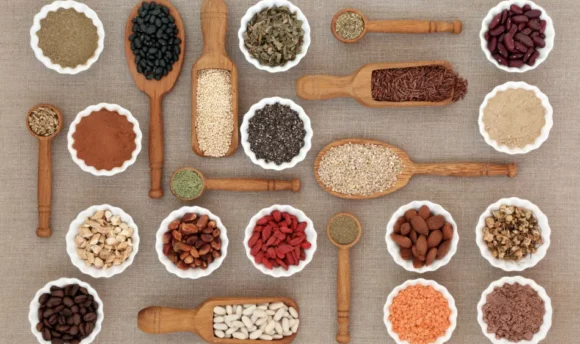Is Ice Cream Healthy? Nutrition, Calories, Benefits
Ice cream can be pretty tempting, especially once you have downed the first spoon. But the big question is, is it healthy for you? Let’s find out.

Ice cream is usually consumed as a dessert, and it’s made using different artificial flavors and colors.
Whether chocolate, vanilla, strawberry, or dough, ice cream has a creamy consistency that’s just perfect. Due to its sugary taste, most people wonder about the negative health effects of engaging in an occasional treat just to satisfy their taste buds.
Is Ice Cream Healthy?
Ice cream has a high milk content, which means it’s rich in vitamins like vitamin D, vitamin A, and zinc. So, yes, it can definitely be categorized as a healthy diet.
However, as with every diet, moderation is key. One cone of ice cream in a day isn’t going to harm you, it’s what you do regularly that matters.
Taking large portions of ice cream every day might have several health drawbacks; after all, excessive sugar intake can lead to weight gain, high sugar levels, and hormone fluctuations.
5 Benefits of Ice Cream
Almost everyone enjoys indulging in ice cream during summer because it provides a cooling sensation to combat the heat.
Ice cream is more than a tasty treat, and you’d be surprised at the health benefits of taking an ice cream cone. Let’s look at a few:
#1 High in nutrients
When it comes to nutrients, ice cream contains milk, and milk is rich in calcium, phosphorus, vitamin K, and riboflavin. With its high level of calcium, ice cream helps in bone development and metabolism. It also helps prevent cardiovascular disease and kidney stones.
When there’s a deficiency of phosphorus, your body cannot absorb calcium, thereby affecting your bone health. When your bone health isn’t at its peak, you have a higher chance of developing joint pains.
The artificial flavorings added to ice cream also increase its nutrition quotient. For example, the natural vanilla flavor is rich in antioxidants, while the dark chocolate flavor contains flavonoids that help prevent heart disease and other age-related degenerative disorders.
Also, ice cream is rich in vitamin D, which plays a vital role in the body as it prevents blood clotting. The vitamins contained in ice cream help promote the functions of the nerves and organs in the body.
So, when taken in moderation, ice cream can be classified together with healthy foods.
#2 Helps stimulate the brain
Ice cream isn’t just a sweet and refreshing treat, it’s the right frozen dessert you need to kickstart your morning.
People who eat ice cream in the morning are usually more alert throughout the day than those who drink just cold water, and that’s because eating ice cream stimulates the formation of a brain chemical that’s responsible for sleeping and your overall mood.
Many types of ice cream contain minerals and vitamins that give your brain a mental boost. Plus, it also has an increasing effect on your dopamine levels, making you feel elated and happy.
When consumed occasionally, ice cream is just the right breakfast for you.
#3 Helps strengthen your bones
Calcium is one of the few nutrients needed for your body’s bone health, and it’s important in muscle function as well. We often classify most ice creams as unhealthy, but on the contrary, it’s a dairy product with a good amount of necessary minerals, calcium inclusive.
Ice cream is made from milk loaded with calcium, and this sweet treat is enough to build strong bones and your skeletal health.
The body cannot produce calcium on its own, so it’s important to find a way to get it into your body to meet your body’s calcium requirement. What better way than with your favorite ice cream?
Also, when calcium combines with phosphorus in your body (which can also be found in ice creams), it helps increase your bone strength and keeps your metabolism running well.
#4 Helps boost immunity
Ice cream contains essential nutrients like vitamin A, zinc, selenium, and vitamin D, all of which are vital for a healthy immune system.
Eating ice cream helps your immune system, but be sure to practice portion control. Ice cream is usually classified as a fermented dairy, which means it helps your body fight off respiratory and gastrointestinal infections.
When you have a strong gut system, you automatically have a strong immune system. So, if you are looking to give your immune system a boost, include low-fat ice cream in your diet.
#5 Can help boost fertility
This is a super great reason for future moms to eat ice cream. Are you trying to get pregnant? If yes, then it’s time to go to your nearest grocery store for a cup of ice cream.
Ice is a high-fat dairy product, and one study showed that women who consumed dairy products had higher fertility rates and fewer ovulation issues than those who took non-fat dairy products.
Vanilla Ice Cream Nutrition Facts
The nutritional value of two different flavors of ice cream is never the same. Although the nutrition content varies depending on the type of ice cream and artificial ingredients added, they are all still an excellent source of energy.
Ice cream contains two important minerals, calcium and phosphorus, both of which are needed by the body to function to their maximum.
Consuming only calcium and ditching phosphorus won’t have a significant positive impact on your body, but with ice cream, you get both nutrients in one scoop.
While the nutrients in ice cream don’t make it an overly healthy diet to be consumed daily, it has its healthy perks when indulging occasionally.
Nutrition table (per 100g)
The nutritional value of ice cream will vary based on its flavor and type.
| Calories/Nutrient (per 100g) | Amount |
| Calories (kcal) | 207 |
| Sodium (mg) | 80 |
| Net Carbs (g) | 20.1 |
| Fiber (g) | 0.7 |
| Sugar (g) | 21.2 |
| Fats (Total) | 11 |
| Protein (g) | 3.5 |
| Cholesterol (mg) | 44 |
| Calcium (mg) | 128 |
High in carbohydrates
Ice cream is generally high in carbs, and if you are on a keto diet, you might want to be careful when eating ice cream. If you add toppings, such as Nutella or chocolate sprinkles, to your scone of ice cream, they become even higher in carbs and calories.
100g of vanilla ice cream contains 20.1g of carbohydrates, which is enough to provide your body with enough energy to fuel the day.
High in calories and fats
Generally, ice cream contains saturated fats, regardless of the type or brand. Ice cream must contain 10–16% of milk fat to be considered ice cream, and milk fat is mostly cholesterol and saturated fat.
Most ice creams are high in calories, and the richer and creamier the ice cream, the more calories and fat it’ll likely contain.
So, if you plan to lose weight, you might need to be conscious of your daily limit.
Low in protein
Ice cream is considered a low-protein food because it doesn’t contain enough protein to be classified otherwise. A 100g of vanilla ice cream contains 3.5g of protein, and this is not enough for your body’s daily protein requirement, and that’s because adults require about 46–56g of protein every day.
Moderate amount of cholesterol
Cholesterol level varies depending on the type of ice cream. Gluten-free ice cream has lower cholesterol compared to hard ice cream.
Ideally, 100g of vanilla ice cream contains 44mg of cholesterol, which is considered moderate.
However, if you have multiple health conditions that link to high cholesterol levels, it might be best to opt for low-fat ice cream.
High in vitamins and minerals
Ice cream is a great source of nutrients, and it’s packed with vitamins B6, B12, D, E, and C. It’s equally rich in riboflavin, thiamine, and niacin, which help improve the functions of the organs.
So, with one scoop of ice cream, you are getting all of these vitamins into your system.
May contain additives
Usually, guar gum is used to keep ice creams from melting, and while that’s a good thing, it’s also considered an additive.
When buying ice cream, make sure you get one with easy-to-read ingredients so you know if it contains unhealthy additives or not. Preferably, you can make your ice cream from the comfort of your home.
Healthy Homemade Ice Cream Recipe
Heavily processed ice cream never makes a well-balanced diet because it contains too many chemicals and unhealthy ingredients that might harm your health.
If you love ice cream, then it’s best you buy an ice cream maker or food processor, so you can always enjoy ice cream whenever you want. But remember, moderation is key.
Let’s look at an easy recipe for making strawberry-chocolate chip yogurt ice cream.
You’ll need;
- 1 tsp of vanilla extract or vanilla beans
- 1/4 cup of mint chocolate chip
- 1 1/2 cup of sliced strawberries
- 1/4 cup of honey
- 3 cups of plain Greek yogurt
This is a DIY process, and your ice cream should be ready in 3 hours.
- Get a baking sheet and line it using parchment paper.
- Mix your vanilla, honey, and yogurt in a small bowl (make sure you stir properly).
- Spread the mixture on the baking sheet, and scatter your sliced strawberries and chocolate chips on the surface.
- Allow it to freeze for 3 hours, and you have your ice cream all set.
FAQs
When consumed moderately, ice cream can be a healthy diet.
Yes, when eaten too much, ice cream can definitely make you gain weight.
One cup of ice cream contains 279 calories.
A Word From Our Nutritionist
Ice cream usually contains added sugar, and when it doesn’t, there are definitely harbor sweeteners in the mix. As with most processed desserts, too much ice cream can raise your cholesterol and sugar levels. So, even if you must indulge, limit added sugars.
When opting for a more wholesome dessert, keep in mind that you might be consuming excess sugar, and that’s not good for you. With ice cream, bad eating habits can promote intestinal inflammation, so watch your intake.
The FDA banned 7 artificial flavorings due to their correlation with health complications. To be on the safe side, it’s best to always make your ice cream yourself.
Conclusion
Yes, ice cream is healthy, but you must always eat with caution. Going overboard will likely harm your health in the long run and even cause you to gain weight.
Enjoy the different flavors of ice cream, but be sure to eat other healthy meals as well.

















































 Select your language:
Select your language: 








